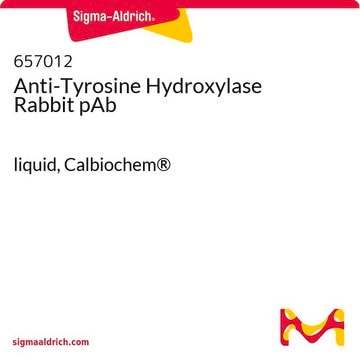MAB318-AF488
Anti-Tyrosine Hydroxylase Antibody, clone LNC1, Alexa Fluor™ 488 Conjugate
clone LNC1, from mouse, ALEXA FLUOR™ 488
Synonym(e):
Tyrosine 3-monooxygenase, Tyrosine Hydroxylase, Tyrosine 3-hydroxylase, TH
About This Item
Empfohlene Produkte
Biologische Quelle
mouse
Qualitätsniveau
Konjugat
ALEXA FLUOR™ 488
Antikörperform
purified antibody
Antikörper-Produkttyp
primary antibodies
Klon
LNC1, monoclonal
Speziesreaktivität
human, chicken, mouse, frog, zebrafish, rat
Methode(n)
immunocytochemistry: suitable
Isotyp
IgG1κ
NCBI-Hinterlegungsnummer
UniProt-Hinterlegungsnummer
Versandbedingung
wet ice
Posttranslationale Modifikation Target
unmodified
Allgemeine Beschreibung
Spezifität
Immunogen
Anwendung
Neurowissenschaft
Entwicklungsneurowissenschaft
Qualität
Immunocytochemistry Analysis: A 1:100 dilution of this antibody detected Tyrosine Hydroxylase in rat cortical neurons.
Zielbeschreibung
Physikalische Form
Lagerung und Haltbarkeit
Sonstige Hinweise
Rechtliche Hinweise
Haftungsausschluss
Not finding the right product?
Try our Produkt-Auswahlhilfe.
Lagerklassenschlüssel
12 - Non Combustible Liquids
WGK
WGK 2
Flammpunkt (°F)
Not applicable
Flammpunkt (°C)
Not applicable
Analysenzertifikate (COA)
Suchen Sie nach Analysenzertifikate (COA), indem Sie die Lot-/Chargennummer des Produkts eingeben. Lot- und Chargennummern sind auf dem Produktetikett hinter den Wörtern ‘Lot’ oder ‘Batch’ (Lot oder Charge) zu finden.
Besitzen Sie dieses Produkt bereits?
In der Dokumentenbibliothek finden Sie die Dokumentation zu den Produkten, die Sie kürzlich erworben haben.
Unser Team von Wissenschaftlern verfügt über Erfahrung in allen Forschungsbereichen einschließlich Life Science, Materialwissenschaften, chemischer Synthese, Chromatographie, Analytik und vielen mehr..
Setzen Sie sich mit dem technischen Dienst in Verbindung.






